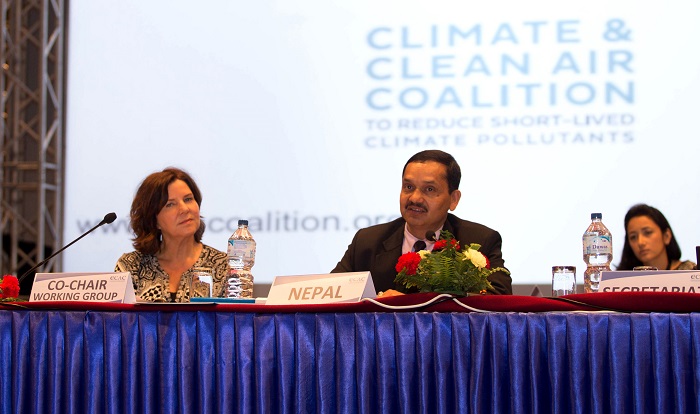KATHMANDU, Nepal: Over 100 state and non-state partners of the Climate and Clean Air Coalition (CCAC) met in Kathmandu to develop a five-year strategic plan of action on Tuesday.
The plan will enable us to stay on the pathway of limiting global warming to 2°C, harness health, food, and energy benefits, and spur sustainable development.
Having just celebrated its third anniversary, the CCAC is looking at ways of improving on its past successes by raising the ambitions of the Coalition’s members and catalysing different sectors to participate in its initiatives in order to drive real reductions in short-lived climate pollutants (SLCPs) over the next five years and beyond.
The meeting, hosted by the International Centre for Integrated Mountain Development (ICIMOD), covered some of the pressing issues in the Hindu Kush Himalayan region. Climate change is happening faster and in a dramatically more visible manner in the Earth’s cryosphere – regions of ice and snow – than anywhere else on earth. The mountains of this region store more freshwater in the form of ice and snow than any other region outside the poles: nearly 10% of the global total, impacting up to 40% of the world’s population. Outdoor air pollution levels in this region exceed World Health Organization (WHO) guidelines of 10 μg/m3 by a factor of 8, contributing to roughly 2 million premature deaths annually in Asia alone. Globally, indoor and outdoor air pollution contributes to 7 million premature deaths every year.
Speaking at the opening ceremony, Govind Raj Pokharel, Vice Chair of Nepal’s National Planning Commission (NPC), said that the Nepal government is working to reduce short-lived climate pollutants like black carbon, as well as to reduce biomass burning through improved cooking stoves. The goal is to make Nepal indoor pollution free by 2017. He stressed the need for regional and international cooperation. “Combating pollution demands regional efforts,” he said. “More international funding needs to be allocated for cleaner alternatives such as improved cooking energy sources.” Mr Pokharel also thanked organizations like ICIMOD for carrying out research that can inform national policy makers. “While Nepal has not yet joined this coalition, we will initiate the process to become a member so that we can both contribute to and take advantage of the opportunities provided by this group”, he added.
Special events were held to find ways to promote two important issues – preventing open burning of agricultural waste and residues, and improving brick production – on the political agenda, and to identify and disseminate sound practices and technologies.
Brick production is a major source of black carbon and other short-lived climate pollutants (SLCPs). Asian countries account for 90% of the 1.5 trillion bricks produced every year. In light of this fact, CCAC and ICIMOD hosted another workshop from 18 to 20 February on Brick Kiln Policy and Advocacy Network (PAN). The workshop aimed to improve brick kiln policy by taking into account the economic, technological, environmental, and social context of each country and setting up a plan to take PAN forward. It was noted that emissions could be reduced by 10-15% with the use of more efficient technologies, mainly during the firing of bricks.
At the opening of the workshop, Honourable Chandra Maharjan, a Constituent Assembly member who is also a brick kiln entrepreneur, stressed the need to encourage the public to use bricks produced from cleaner kilns by introducing policies like annual home tax refunds. The workshop provided a platform for exploring effective policies and sharing experiences of implementing efficient energies in the brick sector in Asia, Latin America and Africa. Participants discussed regulatory frameworks for devising effective policies for transforming the brick-making sector in the three target regions, as well as identified experts from India, Pakistan, Vietnam, Nepal and Bangladesh who are willing to join the network.
The open burning of agricultural waste and residues is another major source of black carbon emissions. Open burning maps based on satellite data have been produced to better understand the timing and origins of burning in two target regions – the Andes and the Himalayas – month by month from 2003 to 2013. For the Himalayan region, the maps show that burning is most prevalent in Bangladesh, Bhutan, China, India, Mongolia, Nepal, and Pakistan.
At a conference held in Kathmandu on 20-21 February, experts in the region explored alternative no-burn methods and options to reduce open burning of the most common crops. They identified potential solutions such as alternative agricultural practices and the conversion of waste and residues to biogas, providing a local source of energy.
In his presentation, Dr Svante Bodin from the International Cryosphere Climate Initiative (ICCI) stressed the importance of involving local communities in achieving environment targets. He said that the CCAC scoping project in the Himalayan Region would seek to “answer basic questions like where and when the burning take place, identify the crops that are being burned, the farmers’ reason/s for burning particular crops/lands, and possible alternatives.” Hanne Bjurstrom, Norway’s Special Envoy for Climate Change and Co-chair of the CCAC’s Working Group, said that the development of the CCAC’s five-year strategic plan is an important milestone for the Coalition. “The strategic plan will raise the ambitions of the Coalition’s members, catalyse different sectors to participate in pollution reduction initiatives and drive real reductions in short-lived climate pollutants over the next five years and beyond,” Ms Bjurstrom said.

